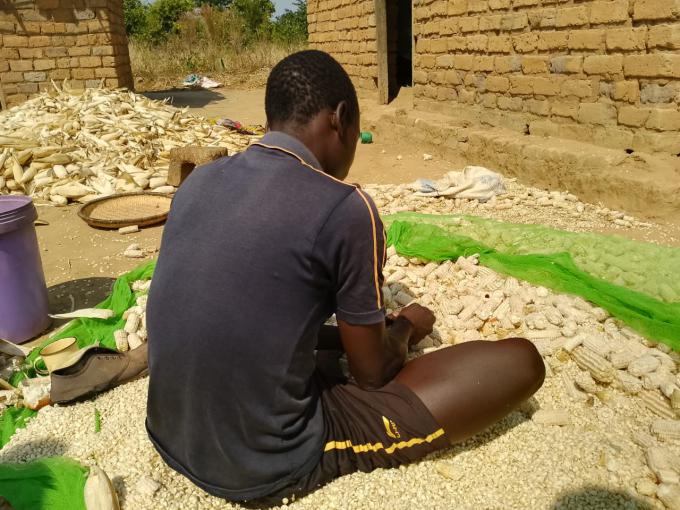Abandoned to their fate

“Maloto ghane nkhukhumba ndizakhale msambizgi kuti ndizawasambizgi wana wa kudera lithu (I have always wanted to be a teacher, so that in the future, I can teach children from this area),” said 16-year-old Samuel (not real name), from Chabandauka Village, Traditional Authority (TA) Mzukuzuku in Mzimba district.
Just like many other children in the area, Samuel's hopes and dreams were shattered when his parents went their separate ways.
Following the divorce a few years ago, his father remarried, while his mother tied the knot with another man.
Samuel and his two siblings were left in the care of their elderly grandmother.
"After his parents remarried, all the children were brought here, to be under my care," said Justina Nkhata, Samuel’s grandmother.
Nkhata has two children, both girls. Samuel’s mother brought three children while the other, who remarried at Jenda in the same district, brought two children.
Currently, Nkhata, who lives from hand to mouth, has five children to feed.
“The only child support I receive from my children for my grandchildren is K3,000 per month, and often they don’t send any support,” she stated.
Life was extremely challenging for the children, Samuel noted. With his dreams slipping away as he missed classes regularly.
"That's when I opted to leave school and take on odd jobs to assist my grandmother in caring for the children," he explained.
He was in standard 7 then.
Samuel found employment at a tobacco farm belonging to Mr. Mumba, 16 kilometres from his village after meeting some labour agents.
He joined a group of tenants, including some his age mates, recruited from different locations in the district.
It was agreed that Samuel would receive K50 000 at the end of the growing season.
"I had no choice, I had to leave because at home, we had very little," Samuel explained.
He received shelter in rundown mud huts and one meal a day, as benefits.
Just a short distance from Samuel's village, a 17-year-old named Chikumbutso (pseudonym) stopped attending Swaswa Primary School during the fourth grade.
Chikumbutso who comes from Mayazi Saka Village in the same TA, joined his friends in tending to cattle in 2013.
An ambitious young man who wants to be a teacher had his dreams cut short for a K500 per day job.
Just as Samuel's case, Chikumbutso and his three siblings were left at their grandmother's house when their father remarried and their mother found a new partner.
Six months into his contract on the farm, Samuel was rescued by the Child Protection Committee.
However, Mumba was hesitant to pay him, claiming that by resigning early, Samuel breached the contract.
Only after the committee intervened, Samuel was finally paid K26,000.
Chikumbutso is still awaiting his rightful compensation.
Both Justina Nkhata and Emily Kasambara, grandmothers of Samuel and Chikumbutso respectively, said they allowed them to find work because they could not manage to take care of the children.
Both individuals were saved from child labor by the Child Protection Committee.
According to Denis Gondwe, a child protection officer in the area of Traditional Authority Mzukuzuku, they have successfully rescued 79 children from child labor this year.
Among these 79 children, 7 were girls who were either hired to sell goods at the market or were employed, while the remaining were boys who worked on tobacco farms as tenants or were tasked with caring for livestock.
“Many children are being exploited by estate owners due to their extreme poverty while being cared for by their grandparents," he said.
Gondwe added that they collaborate with Area Development Committees (ADCs), chiefs, and have formed farmers committees to address this issue.
If needed, they turn to the district labour office as a final option before resorting to legal action.
However, he said the only court case concluded was registered in 2017 and was related to wages, not child labour.
“The practice of leaving children with their grandparents after their parents divorce and find new partners is contributing to child labor in the region. If there are no grandparents available, these children end up fending for themselves. This is a significant issue,” he added.
Lucky, Samuel and Chikumbutso are now back in class. Samuel has just sat for his P Primary School Leaving Certificate of Education, PSLCE while Chikumbutso is now in standard 4.

Labson Nyirongo is a Child Protection Chairperson in the area of GVH Muhabi Shaba (14 villages). He says they register about 7-10 cases monthly.
Main cases include children working in tobacco farms, children herding cattle, children engaging in small scale businesses (mandasi) instead of going to school, and sometimes getting married early.
He says the main cause of child labour cases is separation of parents and child abandonment by parents.
Chief Labour Officer in the Ministry of Labour, Francis Kwenda, said the country faces a daunting task to end child labour because of poverty as most households struggle and as such send their children to work in estates.
“Currently child labour in Malawi stands at 38 percent, according to the 2015 National Statistical Office (NSO) survey. This is up from the 2002 survey which had child labour at 37 percent. Of these statistics, one percent of the children work in the agriculture sector,” Kwenda told the Malawi News Agency (MANA) recently.
He said the ministry is working with various partners such as ILO, tobacco industry players and other NGOs to end child labour.
Story by Chancy Namadzuna
 Malawi
Malawi